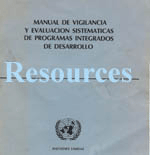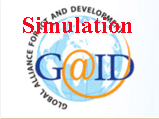|
|
||
|
|
PADM 5345. Evaluation of International
Programs and Projects
|
Current as of December 3, 2023 |
|
|
Syllabus Master Schedule of Sessions and Assignments The in-person sessions in Spring 2024 will meet on Mondays and Wednesdays in M Van Rensselaer Hall G155 from 11:40-12:55. 1
|
|
|
|
|||||||
|
Course Approach |
The course examines results-based management of the programs and projects of international organizations, public and not-for-profit, with an emphasis on the evaluation aspect. To do this, it examines how results-based management concepts and evaluation theory can be applied at the international level, takes the student through the process of planning an evaluation, examines the main analytical techniques that are usually employed and, as a final step, undertakes critical examinations of evaluations of specific projects and programs made by the main organizations at the international level. 2015 was International Year of Evaluation! |
||||||
|
|
There will be a simulation of the planning of an
evaluation in results-based management and exercises related to each of the
main analytical techniques. At the Maxwell School of Syracuse University, in
Spring 2011, the evaluation simulation was of the Internet Governance Forum.
In Fall 2010 it was the evaluation of the Department of Economic and Social
Affairs of the United Nation. In 2009 it was a simulation of an evaluation of
the Internet Governance Forum and
of the current United Nations climate change institutions (the Global
Environment Facility, the UN Framework Convention on Climate Change's Clean
Development Mechanism, UNEP and the United Nations Convention to Combat
Desertification.) For Fall 2011, it was the Gender Equity Programme
of the Food and Agriculture Organization of the United Nations. For Spring
2012, it was the Intergovernmental Panel on Climate Change (IPCC). For Spring
2013 at Cornell, the subject was two real evaluations, one of the UN Convention
to Combat Desertification and the other of the Research Cooperation Program
of the Swedish International Development Cooperation Agency. The subject for
Spring 2014 and also for Spring 2016 was the Intergovernmental
Panel on Climate Change. In Spring 2015, it was UN Women. For 2024, it
will be projects of the Green
Climate Fund. In addition, as a final assignment, each student will
design an evaluation of a program or project of her or his choice and express
it in an inception report. The interactive part of the course takes
place through a weekly live discussion session which is also available over
the Internet. Each student is expected to participate in either the
in-person or through the on-line facility. |
||||||
|
Course Organization |
The interactive part of the course will be a live
discussions on Monday and Wednesday at 11:40 in M Van Rensselaer Hall G155
and by Zoom. Students are expected to participate in this each week. It
is expected that a recording from session will be posted after the session
for those who could not attend or for review by those who could. The lecture,
readings and an audio or video presentation will usually be put up on the
site by Sunday of the week prior to the session. |
||||||
|
Readings |
The course has one required text RealWorld Evaluation, Third Edition, by Michael Bamberger and Linda Mabry. Mike Bamberger was the chief sociologist for the World Bank for many years. The book can also be a useful reference in the future. Other required readings will come from evaluation materials of international public and non-governmental organizations, that are mostly available over the Internet. |
||||||
|
Responses to Session Questions |
For each of the weekly sessions, there are a series of
questions to be addressed. Students are expected to provide short,
one-sentence answers to each of the questions and send them to the graduate
assistants for the course, led by emiriana stanishja who will
assemble them on Sunday before class. |
||||||
|
Simulation |
The first half of the course will include the simulation of planning and implementing an evaluation of a recently approved project of the Green Climate Fund. It will lead to the production of an inception report by each team. Participants will be part of an external evaluation firm
hired to undertake the evaluation for the next meeting of the organization's
board in April. There will be weekly discussions of progress with the
Managing Director of the firm or his designated facilitator. |
||||||
|
Office Hours |
Prof. Mathiason's office hours for Spring 2024 will be on Mondays and Wednesdays from 9:15-11:00 in MvR 3M219 (even if coming during office hours it is better to schedule an appointment). The Professor can also hold office hours on request over Zoom.. |
||||||
|
Grading |
The course will involve a final paper, consisting of an evaluation design of an international program or project reflected in an inception report. Details on the assignment are found on the final paper page. The paper will be a detailed evaluation design written as an Inception Report. Please note that a first draft must be submitted on time for comments. If that is not done, the grade is reduced.
|
||||||
Master Schedule of Sessions and Assignments
|
|||||||||||||||||||||||||||||||||
|
|||||||||||||||||||||||||||||||||
John R. Mathiason.
Copyright 2003, 2004, 2005, 2006, 2007, 2008, 2009, 2011, 2012, 2013,
2014, 2015, 2016, 2017, 2018, 2019, 2020, 2021, 2022, 2023, 2024
,John R. Mathiason. All rights reserved.
Revised: 3 December 2023



